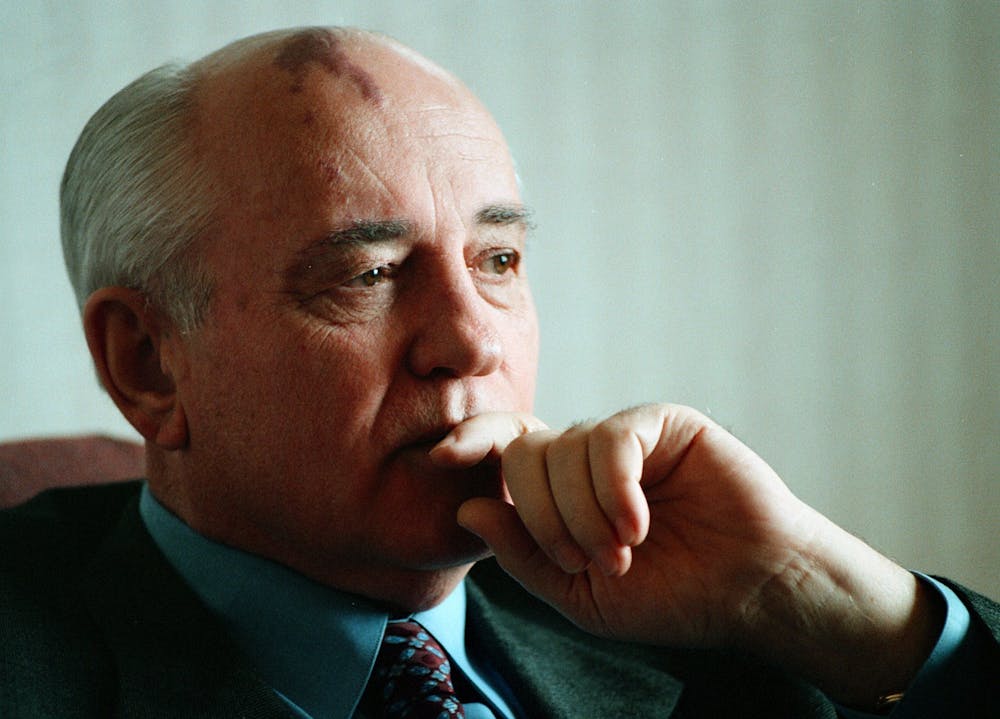Of the late president of the Soviet Union, Margaret Thatcher once said, “I like Mr. Gorbachev. We can do business together.”
That should pretty much tell you all you need to know about him.
Mikhail Gorbachev, the final leader of the Soviet Union, died Aug. 30. The liberal media wrote glowing obituaries, hailing Gorbachev as a great reformer who brought “democracy” and “freedom” to Eastern Europe. Ha!
When discussing the USSR, the West will often use words like “totalitarian,” “police state,” and evoke images of the gulag and anything else they can throw at the world’s first socialist experiment in order to discredit it. Never mind many of these words and phrases can be used against the United States – the U.S. has the most incarcerated population in the world.
And never mind the incredible achievements of this socialist experiment, whether that be the vast advancement of women’s rights, the transformation of a destitute, tsarist backwater into an industrial power capable of beating back the Nazi beasts or putting human beings into space.
This column is about neither the faults of the U.S., nor the accomplishments of the USSR It is simply about what happened afterward.
Afterward, of course, refers to after 1991, when the USSR was dissolved, in large part due to Gorbachev’s reforms. To ask the western media talking heads, the people of the Soviet republics were trading authoritarianism and economic planning for democracy and Pizza Hut.
Well, they did get Pizza Hut.
[Related: OPINION: There will never be equality under capitalism]
They also got a GDP decline in the 1990s worse than the Great Depression in the U.S., hyperinflation, a plunge of several years in life expectancy, and hundreds of thousands of women sold into sexual slavery.
The post-Soviet 1990s saw mass unemployment, gross wealth inequality, rampant crime and what the Guardian called, “the most cataclysmic peacetime economic collapse of an industrial country in history.”
How did this happen? This devastation was the result of what’s called economic “shock therapy,” which is the idea of rapid liberalization of a state-controlled economy into a market economy.
Imagine a country that guarantees employment, housing, healthcare and education almost overnight becoming a country that does none of those things. The Soviet constitution did all of this. When that all ended? “Shock,” seems to be an adequate word.
And it wasn’t just eastern Europe who experienced the calamitous shock. Following the dissolution of the USSR, Cuba lost its biggest trade partner, causing the country to enter what was called the “Special Period,” a time of overwhelming economic insecurity exacerbated by the U.S. trade embargo.
Similarly, North Korea, a country once economically on par with South Korea, saw a marked decline after the end of the Soviet Union, while it’s neighbor to the south began to grow wealthy.
[Related: Socialism will make us better individuals]
The Russian people perhaps faced the greatest decline economically in the 1990s, but other former-Soviet republics didn’t fare much better. Ukraine, for example, was the poorest country in Europe even before Putin’s destructive war. Moldova, another former Soviet republic, is the second poorest.
For all this economic hardship, did the former republics at least get the “democracy” that was promised?
Russia certainly did not. Boris Yeltsin became the first president of the Russian Federation, and his tenure included the 1993 Russian constitutional crisis, in which he sent troops to abolish the Russian parliament, and the 1996 elections of which he’s been credibly accused of stealing. We can also thank Yeltsin for Vladimir Putin, his chosen successor.
But perhaps you think I’m just an ignorant socialist glorifying a defunct country. Well, don’t take it from me – ask the Russian people. A 2021 Levada Center survey of Russians found 63% of respondents regretted the dissolution of the USSR A majority of those regretful citizens were above the age of 40 and lived through it.
Was the Soviet Union perfect? By no means. Its leaders made grave economic errors, particularly after the 1960s, and it limited civil liberties to a far too unreasonable degree. It was never the society Marx, or even Lenin, envisioned. But in many ways, as outlined in this column, it improved the lives of millions of people, and its fall was a complete disaster.
Gorbachev is largely responsible for all of this. His reforms accelerated the decline of the Soviet economy. He shouldn’t be praised in death. He should be remembered for the suffering he caused his people.
Jared Quigg (he/him) is a junior studying journalism and political science.




